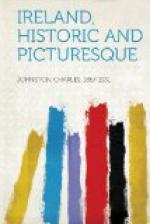Meanwhile the fighting had gone on at Mag Tuiread by the lakes, till but three hundred of the Firbolgs were left, with Sreng, the fierce fighter, at their head. Sreng had gained enduring fame by meeting Nuada, the De Danaan king, in combat, and smiting him so that he clove the shield-rim and cut down deep into Nuada’s shoulder, disabling him utterly from the battle. Seeing themselves quite outnumbered, therefore, the survivors of the Firbolgs with Sreng demanded single combat with De Danaan champions, but the victors offered them worthy terms of peace. The Firbolgs were to hold in lordship and freedom whichever they might choose of the five provinces; the conquerors were to have the rest.
Sreng looked around among his band of survivors,—a little band, though of great valor,—and he remembered the hosts of his people that had entered the battle three days before, but now lay strewn upon the plain; and thinking that they had done enough for valor he accepted the offered terms, choosing the Western Province for his men. In memory of him it was called Cuigead Sreing for generations, until Conn of the Five-Score Battles changed the name for his own, calling the province Connacht, as it is to this day.
It fared less well with the victors, and with their victory were sown seeds of future discord. For Nuada, the king, being grievously wounded, was in no state to rule, so that the chief power was given to Breas, first envoy of the De Danaans. Now Breas was only half De Danaan, half Fomor, and would not recognize the De Danaan rites or laws of hospitality, but was a very tyrannous and overbearing ruler, so that much evil came of his government. Yet for seven years he was endured, even though meat nor ale was dispensed at his banquets, according to De Danaan law.
Mutterings against Breas were rife among the chiefs and their followers when the bard Cairbre, whose mother Etan was also a maker of verses, came to the assembly of Breas. But the bard was shown little honor and given a mean lodging,—a room without fire or bed, with three dry loaves for his fare. The bard was full of resentment and set himself to make songs against Breas, so that all men repeated his verses, and the name of Breas fell into contempt. All men’s minds were enkindled by the bard, and they drove Breas forth from the chieftainship. Breas fled to his Fomor kindred in the isles, with his heart full of anger and revenge against the De Danaans.
He sought help of his kindred, and their design was told to the Fomorian chieftains—to Balor of the Evil Eye, and to Indec, son of De Domnand, chiefs of the Isles. These two leaders gathered ships from all the harbors and settlements of the Fomorians, from the Hebrides, the Shetlands, and far-distant Norway, so that their fleet was thick as gulls above a shoal of fish along the north shores of Erin.




